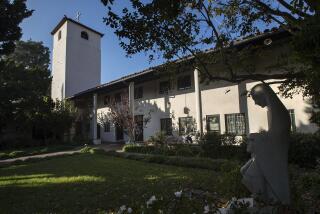Monastery That Helps AIDS Infants Confronts Hostility
- Share via
SAN FRANCISCO — Firefighters refused to respond to medical emergencies at the monastery, garbage men wouldn’t pick up its trash and a county health worker described its tiny patients as “little rattlesnakes.”
The reason: Starcross Monastic Community, a Roman Catholic monastery run by lay workers, wanted to provide a home for infants with AIDS.
Yet through it all, much of the bad was offset, Tolbert McCarroll said.
“For every problem we encountered, there was some surprising force that came along to balance it,” said McCarroll, author of “Morning Glory Babies.”
McCarroll, known as Brother Toby, said the book is an “unconcealed plea” to readers to adopt infants infected with the AIDS virus who otherwise will “spend their days in walkers tethered to doorknobs in hospital corridors.”
“There are a lot of misconceptions about how ill these babies are,” he said in an interview. “People think they are nothing but trouble, always sick.
“Nothing could be further from the truth, as we hope our story shows.”
In his book, McCarroll describes a social worker yanking Starcross Monastic Community’s 12-year-old foster-care license because it would not abandon plans to care for the infants; a neighbor telling reporters that the nearby town of Annapolis didn’t consider Starcross “part of the community anymore,” and a poster being defaced with graffiti reading: “Catch exotic diseases, kiss AIDS infected kids.”
“We never carried (the babies) near the public road because of some threats shouted from cars,” McCarroll writes in the 160-page book, published last month by St. Martin’s Press.
Even now that two years have passed, McCarroll said, “good will toward us will continue to be a local sin for some time to come.”
The monastery, about 120 miles north of San Francisco, cares for three or four infants with AIDS.
Although the internationally known monastery’s conflicts have been reported before, the book, which details the first two years of Starcross’ efforts to help the babies, offers the most complete picture so far of its struggles since November, 1986.
Aside from neighbors’ fears, the “most antagonistic reaction” came from the government, McCarroll said.
At one point, a social worker ordered McCarroll’s 82-year-old bedridden mother, who lived in a separate house on the remote property in Sonoma County, to be fingerprinted for a criminal check, McCarroll says. After an argument over the matter, he said, the monastery’s license was temporarily revoked.
Despite the problems, “unsolicited helpers” began showing up offering physical labor, supplies and friendship.
A banker with AIDS who has two children started showing up early in the morning to do whatever was needed; an elderly woman would drop off a newly made quilt and baby kimonos every few months; a public health worker brought diapers on his day off, and a retired New York subway worker “tackled the mysteries” of farm chores.
Since 1981, about 1,020 cases of acquired immune deficiency syndrome have struck children younger than 5, according to the Centers for Disease Control in Atlanta. AIDS can be passed from mother to child at or before birth.
McCarroll and health officials warn that by the mid-1990s, thousands of infants will be infected with the virus. Up to half will need foster homes.
More to Read
Sign up for our Book Club newsletter
Get the latest news, events and more from the Los Angeles Times Book Club, and help us get L.A. reading and talking.
You may occasionally receive promotional content from the Los Angeles Times.








